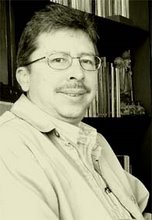Sunday, May 12, 2007
Aparecida do Norte is a small city in Brazil, with 50,000 inhabitants, located in the Valley of Paraíba and in the State of São Paulo. In the midst of the small city is the shrine of Our Lady Aparecida (“the Appeared One”), whose monumental size contrasts with the size of the city and with the tiny image venerated there. The name of this image of the Virgin has to do with the story of how it was found. A group of modest fishermen picked it up in the Paraíba River in 1717. First they “fished” the body of the image, and later its head. This was the origin of a miracle legend, especially because only a few minutes later the fishermen obtained an abundant catch which they attributed to their finding. Felipe Pedroso, one of the fishermen, when he took the Virgin in his hands, said: “This is Our Lady that has appeared to us!” That was the origin of the name of Aparecida.
But let’s go back to today’s town. Even though it’s small and with thousands of pilgrims coming from afar, its hotels showed low occupancy. Thirty percent of the rooms are still vacant. Also in São Paulo, an attendance of a million and a half was expected at the service of canonization of Frei Galvão, but 800,000 showed up. And this morning, 150,000 people attended the outdoor mass, out of a half million expected. A Colombian priest remarked to me in a hallway, “Benedict doesn’t have John Paul’s charisma.” And he added, “John Paul had been an artist and studied theater in his youth; he was very good at communicating with people. Benedict, instead—he’s been a theologian ever since we knew him.”
There’s no doubt that, with Benedict XVI, theology has returned to Peter’s chair. Whether or not we agree with his theology (let’s remember the Instruction on Some Aspects of Liberation Theology, of 1984, or the declaration Dominus Jesus of 2000, or the recent Notification against Jon Sobrino), the truth is that this Pope is a theologian. Those of us for whom theology is a passion or a pastime cannot ignore his Theory of Theological Principles: Materials for a Fundamental Theology, or his Introduction to Christianity, or Creation and Sin, or Faith, Truth and Tolerance, or his texts written with Karl Rahner, among many others.
He is rigorous when arguing over dogma. A sample of this is the first Encyclical in his pontificate, Deus Caritas Est. This encyclical had originally been drafted by Archbishop Paul Josef Cordes, at the request of John Paul II. But Archbishop Cordes himself, in an academic lecture he offered to us yesterday, Saturday afternoon, revealed that the new Pope, once he decided to publish it, went over the whole text and redacted it again until he gave it “the Ratzinger style”. And the Ratzinger style is dogmatic rigor. He begins with the formal statements and then breaks them down with a richness of deductive argumentations. It’s the old deductive method of theocentric theology.
From the extroverted shepherd with pastoral speeches and a long pontificate, there has been a change to an introverted one, with rigorous speeches and a recent pontificate. “He’s a transition Pope,” some friends in CELAM tell me. “A Latin American one will come,” they add as if they knew that’s what’s going to happen. But in the meantime, there’s Benedict, without John Paul’s multitudes, but with the same attentive professor’s chair we had known when he was the Prefect of the Congregation for the Doctrine of the Faith and President of the Biblical Commission and of the Theological Commission.
Let’s welcome theology. I don’t know if that’s good news!
Harold



No hay comentarios:
Publicar un comentario